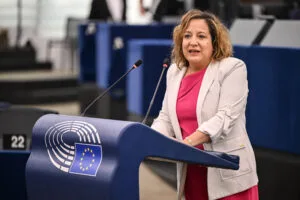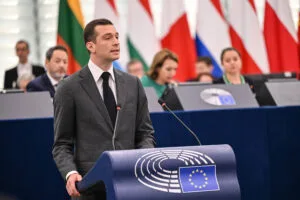from the correspondent in Strasbourg – The first resolution passed by a vast majority by the EU Parliament in its 10th mandate is in line with the one that just ended, but with a new nuance. From the conservative right to the Greens, passing through all the groups of the centrist majority (Popular, Social Democrats and Liberals), there is “steadfast” support for Ukraine, which Russia invaded for almost two and a half years, but also shared condemnation of the“blatant violations of the Treaties and of the EU’s common foreign policy” by Hungary’s Prime Minister Viktor Orbán, who between July 5 and 8 visited Russia and China “in an uncoordinated and unexpected manner.”

“Russia has intentionally perpetrated systematic and large-scale atrocities in the occupied territories and has also indiscriminately attacked residential areas and civilian infrastructure, the most recent example of which is the bombing of the Okhmatdyt Children’s Hospital,” is put in black and white in the resolution signed by all five parliamentary groups and approved today (July 17) with 495 votes in favour, 137 against, and 47 abstentions. Condemnation of the “war crimes and crimes against humanity” carried out by the regime of Vladimir Putin is the fil rouge that leads directly to the j’accuse on the “peace missions” by Hungarian prime minister: “In the aftermath of the so-called peace mission of the Hungarian prime minister Russia attacked the Okhmatdyt children’s hospital in Kyiv, which demonstrated the irrelevance of Orbán’s alleged efforts, which were received with scepticism by the Ukrainian leadership.”
The resolution makes it clear that “the Hungarian prime minister cannot claim to represent the EU when he violates its common positions” and calls for “such a violation to be followed by repercussions for Hungary,” a member country that holds the rotating presidency of the Council of the European Union until Dec. 31. “No one should negotiate with Putin instead of Ukraine,” is the attack by Poland’s Andrzej Halicki (EPP), echoed by the chairwoman of the Progressive Alliance of Socialists and Democrats (S&D) group, Iratxe García Pérez, recoiling against the new far-right group (third in number of members) in the EU Parliament: “We are witnessing the connivance of the far right even in this House with Putin’s regime; the head of the False Patriots group [for Europe, ed.] met with him to denigrate the EU, to proclaim that it has a peace plan that no one knows about, and to promote Russian expansionism.”

German Sergey Lagodinsky (Greens/Ale) also speaks of “false patriots,” while Renew Europe group chair Valérie Hayer denounced the “self-appointed peace mission, using the EU without any mandate.” Not siding with the resolution is the Left group because, according to co-chair Martin Schirdewan, “a negotiation is needed but the EU has taken no initiative; sending more weapons will not bring an end to the war.” Strenuous defence of Orbán’s actions came from the President of Patriots for Europe, Jordan Bardella, and that of the group further to the right, Europe of Sovereign Nations, René Aust. The former conceded that Russia’s is “an illegal and unjustified war of aggression” but counter-attacked, arguing that “condemnation of Orbán jeopardizes European unity; Hungary cannot be blamed for maintaining peace contacts.” The latter called for “a change of strategy” because “the time is ripe for peace talks, and I am grateful to Orbán for taking responsibility even if there is resistance.”
The crux of the first resolution in the EU Parliament
If the condemnation of Orbán united the five groups from the Conservatives to the Greens, the same cannot be said on a particularly sensitive point of the resolution, namely paragraph 5. More specifically, the specification that the EU Parliament “strongly supports the lifting of restrictions on the use of Western weapons systems supplied to Ukraine against military targets on Russian territory.” On this point, there was a split in the vote, where—for different reasons—almost all Democratic Party MEPs voted against the passage supporting the use of Western weapons to strike military targets in Russia (as the wording could also mean, absurdly, the Ministry of Defense in Moscow), as did Greens Leoluca Orlando, Cristina Guarda, and Benedetta Scuderi, but especially the eight members of the League of Patriots for Europe (who, as of today, do not have a pro-Russian setting) and the eight members of the 5 Star Movement. Speaking of the Left Group, Domenico Lucano and Ilaria Salis abstained on the issue, as did all the MEPs of Fratelli d’Italia.
Since all amendments were rejected, the original text remained unchanged, supported finally by all members of Fratelli d’Italia, Forza Italia, and the Democratic Party (except only Marco Tarquinio and Cecilia Strada, who abstained). Opposed, inevitably, were the MEPs of the Lega, but also those of the 5-Star Movement and the two elected for the Green/Left Alliance (the Left group split with one-third in favour and another third abstaining), and above all the three Italian Greens, the only ones to stand against the resolution pushed by their own group because of the implications of the passages on sending arms and on member states spending “at least 0.25 per cent of annual GDP” to support Ukraine “militarily.”
English version by the Translation Service of Withub

![Mihaly Varga, presidente di turno del consiglio Ecofin, dà inizio ai lavori. Tutti i partner contro di lui [Bruxelles, 16 luglio 2024. Foto: European council]](https://www.eunews.it/wp-content/uploads/2024/07/ecofin-hu-350x250.jpg.webp)







